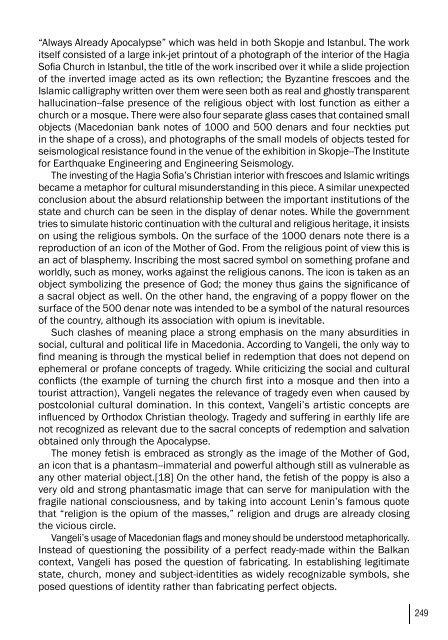art-e-conomy _ reader - marko stamenkovic
art-e-conomy _ reader - marko stamenkovic
art-e-conomy _ reader - marko stamenkovic
You also want an ePaper? Increase the reach of your titles
YUMPU automatically turns print PDFs into web optimized ePapers that Google loves.
“Always Already Apocalypse” which was held in both Skopje and Istanbul. The work<br />
itself consisted of a large ink-jet printout of a photograph of the interior of the Hagia<br />
Sofia Church in Istanbul, the title of the work inscribed over it while a slide projection<br />
of the inverted image acted as its own reflection; the Byzantine frescoes and the<br />
Islamic calligraphy written over them were seen both as real and ghostly transparent<br />
hallucination--false presence of the religious object with lost function as either a<br />
church or a mosque. There were also four separate glass cases that contained small<br />
objects (Macedonian bank notes of 1000 and 500 denars and four neckties put<br />
in the shape of a cross), and photographs of the small models of objects tested for<br />
seismological resistance found in the venue of the exhibition in Skopje--The Institute<br />
for E<strong>art</strong>hquake Engineering and Engineering Seismology.<br />
The investing of the Hagia Sofia’s Christian interior with frescoes and Islamic writings<br />
became a metaphor for cultural misunderstanding in this piece. A similar unexpected<br />
conclusion about the absurd relationship between the important institutions of the<br />
state and church can be seen in the display of denar notes. While the government<br />
tries to simulate historic continuation with the cultural and religious heritage, it insists<br />
on using the religious symbols. On the surface of the 1000 denars note there is a<br />
reproduction of an icon of the Mother of God. From the religious point of view this is<br />
an act of blasphemy. Inscribing the most sacred symbol on something profane and<br />
worldly, such as money, works against the religious canons. The icon is taken as an<br />
object symbolizing the presence of God; the money thus gains the significance of<br />
a sacral object as well. On the other hand, the engraving of a poppy flower on the<br />
surface of the 500 denar note was intended to be a symbol of the natural resources<br />
of the country, although its association with opium is inevitable.<br />
Such clashes of meaning place a strong emphasis on the many absurdities in<br />
social, cultural and political life in Macedonia. According to Vangeli, the only way to<br />
find meaning is through the mystical belief in redemption that does not depend on<br />
ephemeral or profane concepts of tragedy. While criticizing the social and cultural<br />
conflicts (the example of turning the church first into a mosque and then into a<br />
tourist attraction), Vangeli negates the relevance of tragedy even when caused by<br />
postcolonial cultural domination. In this context, Vangeli’s <strong>art</strong>istic concepts are<br />
influenced by Orthodox Christian theology. Tragedy and suffering in e<strong>art</strong>hly life are<br />
not recognized as relevant due to the sacral concepts of redemption and salvation<br />
obtained only through the Apocalypse.<br />
The money fetish is embraced as strongly as the image of the Mother of God,<br />
an icon that is a phantasm--immaterial and powerful although still as vulnerable as<br />
any other material object.[18] On the other hand, the fetish of the poppy is also a<br />
very old and strong phantasmatic image that can serve for manipulation with the<br />
fragile national consciousness, and by taking into account Lenin’s famous quote<br />
that “religion is the opium of the masses,” religion and drugs are already closing<br />
the vicious circle.<br />
Vangeli’s usage of Macedonian flags and money should be understood metaphorically.<br />
Instead of questioning the possibility of a perfect ready-made within the Balkan<br />
context, Vangeli has posed the question of fabricating. In establishing legitimate<br />
state, church, money and subject-identities as widely recognizable symbols, she<br />
posed questions of identity rather than fabricating perfect objects.<br />
249


